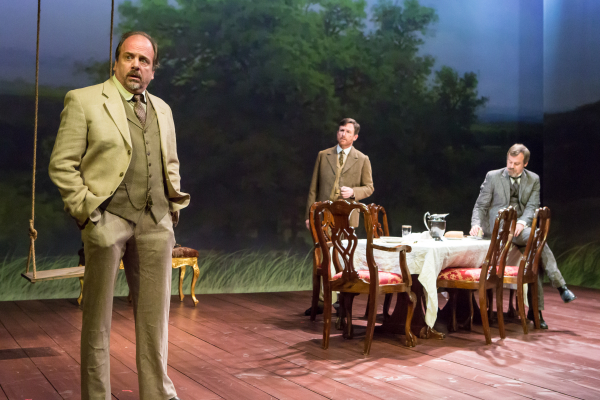Uncle Vanya

(© Al Foote III)
In another life, Anton Chekhov would have made a great psychic. His observations of turn-of-the-century Russian society and the class rage boiling quietly under the surface feel spookily prophetic, considering his plays were written just decades before the Bolshevik Revolution. They also feel relevant to 2014. That's clear in The Pearl Theatre Company's revival of Chekhov's Uncle Vanya, which has the outward appearance of fin de siècle Russia…until the actors start talking and moving. Director Hal Brooks has created what looks like a very traditional production that is actually unabashedly (sometimes unnecessarily) modern.
Vanya (Chris Mixon) is the over-the-hill manager of a Russian country estate. Alongside his niece, Sonya (Michelle Beck), he toils at his desk to scrape out a 2 percent annual return, which mostly goes to support the leisurely city lifestyle of his late sister's husband (Sonya's father), the retired academic Alexander Serebriakov (Dominic Cuskern). When Serebriakov settles for an extended stay at the estate, Vanya's jealousy grows, especially in light of his infatuation with the professor's second, much younger wife, Yelena (Rachel Botchan). Yelena has also caught the eye of Astrov (Bradford Cover), a frustrated country doctor with a passion for forestry. Meanwhile, Sonya is smitten by Astrov. Can such a complicated web of lust and resentment sustain itself on a poor country estate with a two-percent return? (No.)
Set designer Jason Simms has transformed the stage of the Pearl into the Serebriakov estate. A handsome wooden proscenium forms the walls of the house. Gear-like carvings dance across the top, hinting at the economic changes that will sweep away this agrarian paradise. The dining-room chairs are upholstered in red with gold accents. A samovar is nearly always present on stage, resting on a credenza. By the third act, a chaise longue ornamented by a cylindrical pillow with a giant tassel makes an appearance. It's all straight out of the late 19th century.
Barbara Bell's costumes are just as lavish and authentic, from Yelena's dresses featuring puffed sleeves and delicate lace work to the men's country suits, which appear to be made from perfectly tailored wool. Both Serebriakov and Vanya sport rich paisley evening robes, always worn over their shirts and vest, of course.
This buttoned-up, formal design clashes with the casual American manners of the actors. Cover saunters across the stage slapping his hands to his thighs in a very modern expression of ennui. Throughout the play, several actors take a seat atop the large central dining table (a big no-no in Czarist Russia). Many of the actors wear their emotions on their sleeve, a far cry from the repressed anxiety for which Chekhov's text calls. While Brooks has garnered a magnificently coordinated approach from his designers, he has not managed to get all his actors on the same page.
That's not to say the production is devoid of thrilling performances. Beck steals the show as Sonya, revealing her to be the most intelligent and sensible character in the play. She's the glue holding this house together, which is why it is so devastating when she throws reason away in ursuit of Astrov, a whiny man-child (especially as performed by Cover) with an inflated sense of self-importance.
All the male characters in this play are pretty worthless, in fact. Mixon is cartoonishly funny as the hapless Vanya, a man with a high opinion of himself despite his utter inability to do anything right. Cuskern's professor is particularly grating, especially in his parting advice to the underlings of his estate: "You must all get down to work! Do something useful." He's like Paris Hilton evangelizing about the virtues of the meritocracy. In this sense, the actors' lack of Victorian restraint is actually an asset to Chekhov's tale of the myopic patriarchy.
Perhaps Brooks' allowance for 21st-century American manners is a subtle way of tying Chekhov's text to our modern era. But honestly, the play doesn't need it. In Paul Schmidt's excellent translation, Uncle Vanya feels alive and fresh. While playing against design can be a compelling choice on stage, this is not one of those instances.










